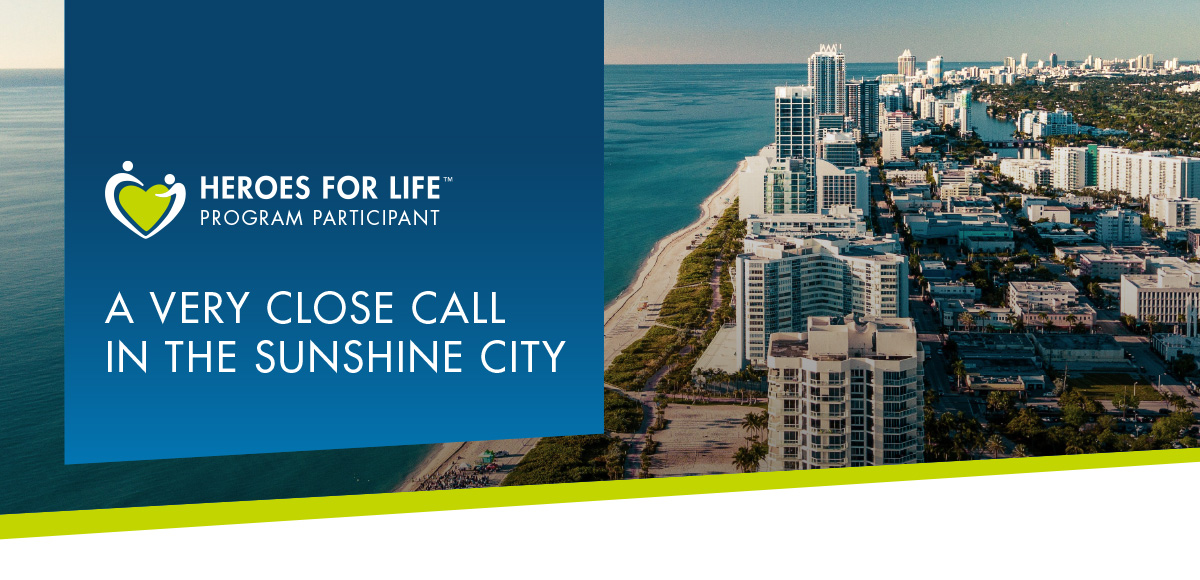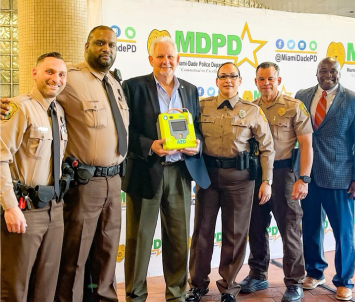
Tony Quintero Rescue Story
It was a busy October morning in the lobby of the Stephen P. Clark Government Center in downtown Miami, Florida. Officer Joandra Dobao was at the security booth, located near the metal detector and the elevator that takes visitors to the county commissioners’ chambers. Tony Quintero, Associate Director for Governmental Affairs at the Miami-Dade Aviation Department, was at the center that morning to brief the board of county commissioners, and something caught Officer Dobao’s attention as he and his colleagues passed through the detector.
“[Mr. Quintero and his colleagues] were about four feet away from me. I watched [Mr. Quintero] pick up his briefcase and heard him tell his companions that he felt dizzy,” Officer Dobao recalls.
Seconds later, Tony fell to his knees, where he paused for a brief second and then fell face first on the floor. “He literally dropped in front of me. I’ve never seen so much blood. It was gushing everywhere,” recalls Officer Dobao. She remembers wondering for a split second what was happening, followed immediately by thoughts of how to respond.
“This is a very important machine. There are other devices out there, but this one talks to you and delivers the shock by itself.
I definitely think that this is something everyone needs.”
— Officer Joandra Dobao, Miami-Dade
police officer and SCA rescuer
Instinct kicks in
“I have no medical experience and saw all that blood. I thought putting him on his side would prevent him from choking,” Officer Dobao recalls. After rolling Tony onto his side, his breathing began to sound more like snoring. “Mr. Quintero turned purple like a plum and then he stopped breathing.” Officer Dobao immediately began cardiopulmonary resuscitation (CPR).
Officer Dobao’s partner, Shelton D. Green, had already called 911. When Officer Dobao began chest compressions, Officer Green suspected sudden cardiac arrest (SCA) and sprinted out to his patrol car to retrieve an automated external defibrillator (AED).
A calm voice in the chaos
Officer Green returned with the ZOLL® AED Plus® defibrillator and turned it on. Recalling from CPR training how important it was to continuously deliver compressions when someone has suffered a cardiac arrest, Officer Dobao didn’t want to stop. But the AED kept repeating the instructions “Attach pads,” so after a few seconds she paused briefly to follow them.
“CPR training is relaxed and occurs in a controlled environment. It’s so different than a real-world scenario,” Officer Dobao recalls, “where your adrenaline starts pumping and you get tunnel vision. It was so helpful to hear the AED keep saying ‘Attach pads.’”
The device analyzed Tony’s heart and advised a shock.

The AED delivered the shock and then advised rescuers to continue CPR. Officer Dobao resumed compressions, but the AED kept saying “Push harder.” Despite pushing so hard that she feared breaking Tony’s ribs, Officer Dobao wasn’t able to deliver effective compressions.
Officer Green took over and on his first attempt ever performing CPR was able to deliver compressions that satisfied the high-quality CPR requirements of the AED, meaning they were effectively getting blood to his heart and other vital organs.
Police AED provides lifesaving support
By the time members of Miami-Dade Fire and Rescue arrived at the lobby to assist, Tony had regained a pulse. EMS transported him to the hospital where doctors treated him for a widow-maker heart attack, a condition in which the left anterior descending artery is nearly blocked.
A few hours later, Officer Dobao’s colleagues saw Tony sitting up in the recovery area, talking with doctors. He attributes his strong recovery to the quick response by Officers Dobao and Green.
Because Officer Dobao and Officer Green were familiar with the signs of sudden cardiac arrest, they recognized the gravity of the situation. They acted quickly to deliver CPR, alert emergency services, and retrieve an AED from a nearby patrol car. Even without medical training, their familiarity with why AEDs are important increased Tony’s chances for a positive outcome.
